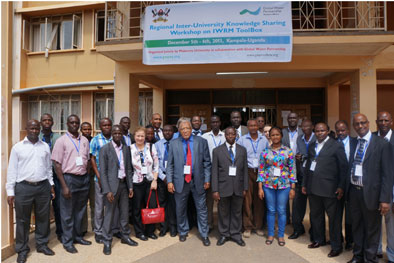Using the economics principle, ‘scarcity’, Prof Bernard Bashasha, the Principal of the College of Agricultural and Environmental Sciences, Makerere University made the prediction drawing on how the present generation is not mindful enough about water wasting in relation to future water demands.
Critical challenges
Citing the case of Uganda, Prof Bashasha said that in contract to the past and present perceptions that “water is cheaper than gold, if the present water wasting is not reversed, there is a foreseeable future where water will be more expensive than gold.”
Availing right knowledge, change of mindset and practices towards water resources in the region were among key suggested pathways to reverse the increasing water scarcity and insecurity in Eastern and Greater Horn of Africa.
Prof Bashasha made the revelation during the inter-university knowledge workshop taking place from 5th-6th December 2013 at the Makerere University, Kampala, Uganda.
Workshop objectives
Over 40 lecturers, researchers drawn from Uganda, Rwanda, Burundi, Kenya and Eritrea, Ethiopia, Sudan are reflecting on how to expand the use of Integrated Waters Management (IWRM) Toolbox in University education and research institutions and demonstrate the application of the IWRM in training and capacity building program.
GWP Eastern Africa Regional Coordinator, Safari Patrick, briefed participants about background, evolution and strategies of GWP and regional office. He reminded participants about GWP’s main emphasis on partnership with diverse stakeholders, including Universities and other knowledge bases such as research centers.
He urged for a broader view of partnership based the interconnectedness, “a partnership is not the sum of its parts; it is the product of the parts' interaction.” Safari Patrick noted.
Global Water Partnership (GWP) representative to the workshop, Dr. Danka J. Thalmeinerova, Senior Knowledge Management Officer, expressed the desire of supporting regional knowledge centers and sharing knowledge with the larger knowledge producers and users.
Participating lecturers and researchers expressed the desire to bridge the gap between knowledge production centers and users in rural areas. Lecturers also asked for insights from the GWP specifically on how to make knowledge sharing more sustainable to the benefit of citizens.
Several Universities showcased how they have incorporated IWRM in their teaching and research endeavors, future priorities and foreseeable challenges and solutions. The workshop was organized by the Global Water Partnership in partnership with the Makerere University and facilitated by regional office of the Global Water Partnership. The vision of the Global Water Partnership (GWP) is for a water secure world. GWP is a network of more than 2,800 partners in 169 countries.
